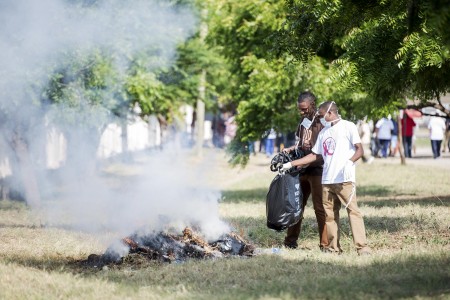
Men burn plastic outside the cancer hospital on Ocean Road on December 9. President John Magufuli cancelled Independence Day celebrations and ordered a national day of cleaning instead. Dar es Salaam is ranked as the 12th dirtiest city in the world. Photo by Daniel Hayduk
Following the Independence Day trash cleanup on December 9, garbage is now on everyone’s mind: so what needs to be done to clean our city permanently?
“The whole infrastructure for waste collection in Dar es Salaam is poor and is a contributing factor as to why we have this problem,” says Matthew Haden of waste management and recycling company The Recycler.
Only 40 percent of Dar’s 4200 tonnes of garbage created daily ends up in the landfill and not all of what ends up there is trash — Haden says recyclables are being tossed out as well.
In the days following the organized December 9 cleanup, heaps of collected garbage were still piled in communities waiting to be picked up and disposed of.
Most visible (and smell-able) of the challenges on Independence Day was the burning of waste — especially inorganic materials such as plastic.
Education on burning habits is also a crucial factor, says Tania Hamilton of public advocacy group Nipe Fagio.
“Burning inorganics is bad. Any smoke contributes to air pollution, health problems and global warming,” says Hamilton.
Air pollution is the number one cause of preventable deaths worldwide.
“If nature made it, leave it, if man made it pick it up. A layer of leaves keeps the soil cool and stops water evaporation, provides food to soil for new plants to grow and helps reduce soil erosion, dust and sand which end up on our roads and in our drains — and in turn needs labour to clean them constantly.”
